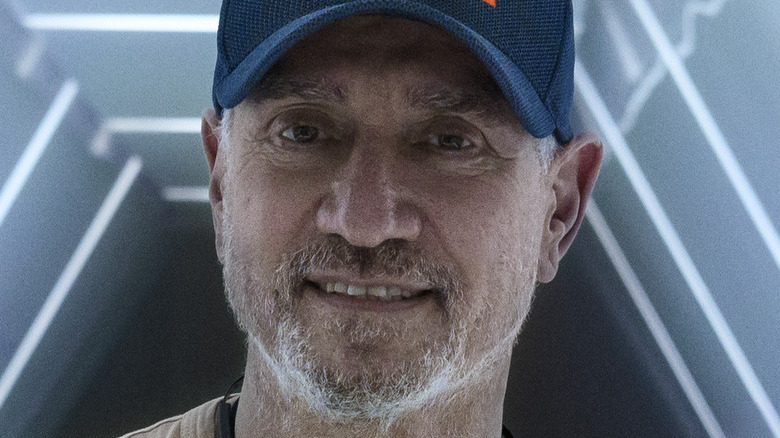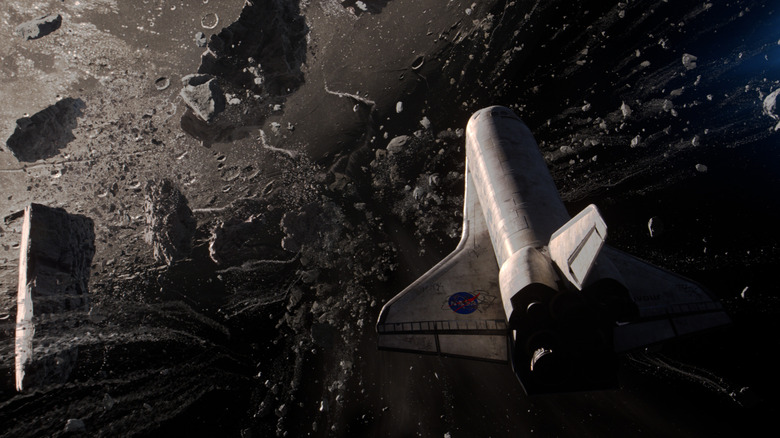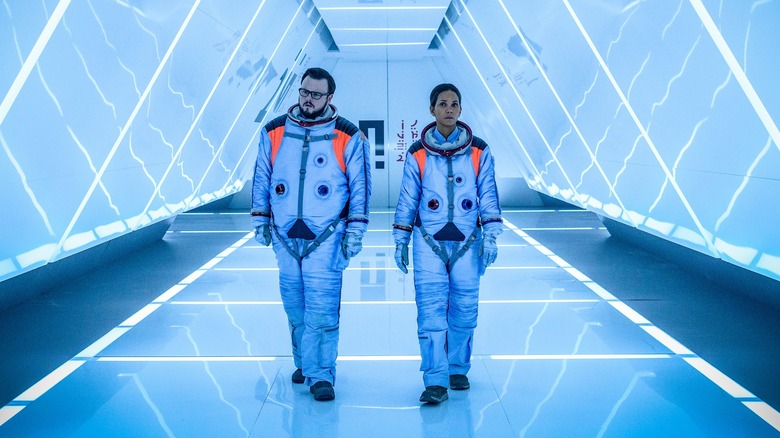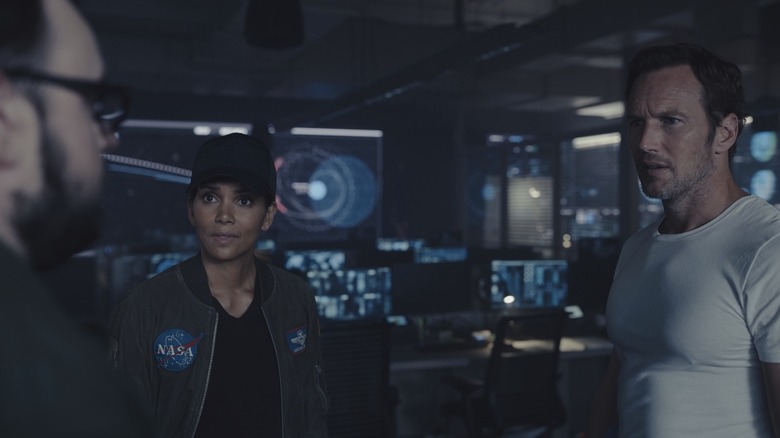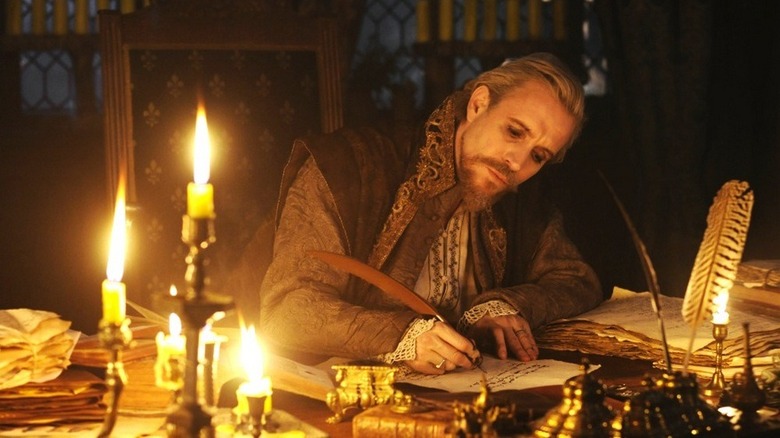Director Roland Emmerich On Making His New Epic Moonfall, Which Of His Films He Likes Best And More - Exclusive Interview
In the new sci-fi-disaster thriller "Moonfall," Halle Berry, Patrick Wilson and John Bradley play, respectively, a NASA executive, a disgraced astronaut, and an amateur scientist who are in a race against time when the Moon leaves its orbit and heads on a downward spiral toward Earth. When the cataclysmic event turns out to be triggered by the incursion of a bizarre anomaly into the Moon a decade earlier — which Wilson's character witnessed — the trio must learn the nature of the apparent intelligence behind it, with revelations that could alter the place of humanity in the universe.
"Moonfall" is directed and co-written by German-born Roland Emmerich, who has been known during the course of his career for spectacles like "Independence Day," "2012," and "The Day After Tomorrrow" that blend often outlandish sci-fi concepts with vast, sprawling vistas of destruction on a global scale. With "Moonfall," Emmerich delivers the catastrophic visuals he's known for (towering tidal waves, cities pummeled by pieces of the Moon) while adding some of the cosmic weirdness from his early hit "Stargate" and even a seasoning of conspiracy theories, like those found in his "who really wrote Shakespeare's plays" 2011 thriller, "Anonymous," based around the nature of the Moon.
With a career stretching back to his first film, a 1984 sci-fi melodrama called "The Noah's Ark Principle" that he made while still a student (and which played that year's Berlin Film Festival), Emmerich's larger-than-life concepts and often bonkers set pieces may not be to everyone's taste but is clearly meant to entertain and, if Emmerich has his way, provoke conversation. "I think I'm pretty happy with all my movies," he tells Looper. "Sometimes you have a hit. Sometimes you have a failure. I'm really used to that, so I'm getting calmer and calmer about that."
Emmerich reveals the theories behind Moonfall
What inspired the idea for this one? Were you reading anything in particular about the Moon, about AI, or anything that clicked?
Well, I read, 10 years ago, a book called "Who Built the Moon?" and it was such a provocative book. Every time I looked at the Moon, I was reminded that I read that book, and slowly out of that came this idea: "What if something happens to the Moon and it falls on Earth, and at the same time, we learn that the Moon is not natural, it's actually built?" That was a cool idea.
I was then thinking, "Another disaster movie, I don't know," but then I said to myself, "Okay, so they have to go up there. They have to figure out how to go up there, and we have to throw a lot of obstacles in their way, and then the big surprise is that inside the Moon, you learn a lot about where we come from." That's where I said, "Okay, this is more a space movie than it's a disaster movie." That was, for me, the reason to do it.
Was any of the material involving artificial intelligence repurposed from "Singularity," which you came very close to making about 11 years ago?
Yes, it was a lot of that theme. There's also a great book called "Homo Deus" which talks about the same thing. If we don't have empathy and then develop artificial intelligence, there have to be more rules. They cannot just create artificial intelligence and give control to that entity. It could be a disastrous thing.
You have a lot of science advisors on this. Are you pretty rigorous about checking with people at places like NASA or JPL to see that there's at least a good scientific context?
Yes, I think you have to because it's a movie about space, it's a movie about what the Moon will do when it gets off course. When not well-researched, people will start asking too many questions, and even then, they will still ask a lot of questions. I still don't believe that the Moon is artificial, but it's just buying into it and [doing] some sort of explaining to people with a twinkle in your eye, [and still being] as accurate as possible.
Doing something new in the disaster movie genre
You mentioned that you didn't necessarily want to do another disaster movie. This does have some destruction occur when the Moon gets closer to the Earth. How challenging is it every time to portray destruction on that kind of scale and find new ways to do it that are going to look fresh?
Every movie has to have its own rules. You know what I mean? It's like kind of "Independence Day" had a certain rule, "Day After Tomorrow" had its own rules, and then "2012" had rules ... flying inside the Moon was really, for me, the fresh idea because pretty much the last 40 minutes of the movie is inside the Moon. That means you see new things and learn new things.
You have any new tools in terms of visual effects that you were able to use on this one?
Well, it's always developing and getting better and easier, but there's still a ways to go to create visual effect shots which look real. It's still a huge fight to make them look real.
John Bradley told us that during the scene when the hotel floods, he thought you were going to use some CG or something, but he was surprised to see you flooded the set for real. You actually did physical, real effects.
(Laughs) But it was the only one.
Lucky him. Is it important to you to deploy physical effects whenever you possibly can?
Yeah, that's what you always do, because it's easier to build a dump tank and make water tides on the set than the other way around, because it would have been [us] saying, "Okay, we have now to have 20, 30 visual effect shots." You save so much money by doing it for real.
Another actor in the film, Eme Ikwuakor, said the thing that struck him the most about working with you was how calm you are on the set with this gigantic production going on around you. Does that come just from experience and making so many movies?
I had a dad who ran a big company as the president and chairman. I think I learned a little bit from him there because you have to always stay calm. I'm also a very organized person, I have to say, but I'm very chaotic when it comes to my house, my two dogs, my husband, etc. That's all crazy, but when I step on a movie set, I know I have to be the calm center. You know what I mean? It's a lot of façade, and inside I'm probably as nervous as everybody else, but I try to stay very calm.
Directing in the era of COVID
This was the first film that you shot in the new world we're in with COVID protocols and all that. How did that affect your method of preparation and your freedom of movement as a director?
Normally when I shoot a movie, I go out a lot with the actors for dinner, and [that's] actually where I am really directing the movie in a way — planting certain ideas in their heads — and I couldn't do that. I was not allowed to do that in COVID times, which was, for me, a big problem because I had to sometimes filter this in while we were working. That's something which I really missed.
On the other hand, it was okay. The only effect was that we needed, all of a sudden, $5.6 million for COVID costs. The budget was locked in already, and you cannot ask anybody, "Oh, give me two or three, four million more," because there's nobody there who will give it to you. I had to lose nine shooting days — and I shot the movie in 61 days, which is quite an accomplishment.
That's very impressive. The end of the movie leaves room that the story can continue. Do you have any ideas in mind about where you could see this story going?
It was always meant as a trilogy of films. The first one is the discovery, and then the next two will be a huge fight ... with the nano swarms, and at one point, it feels like all is lost — that's probably the end of the second film. We'll see how successful "Moonfall" is.
Roland Emmerich names his favorite Roland Emmerich movie
This is your 18th feature film. Do you have a favorite out of all of them, or are they all like your children and there's no favorites?
I have a favorite: "Anonymous."
Why is that your favorite?
Because it says something about the pen being mightier than the sword. The guy who actually wrote all that [Shakespeare's plays] will never ever be named. Everybody knows Shakespeare and maybe Queen Elizabeth, but everybody else is forgotten.
Is there one that you wish you could do over?
No, not really. I think I'm pretty happy with all my movies. Some are better. You always strive for excellence, and you're always nervous about a movie coming out. Sometimes you have a hit. Sometimes you have a failure. I'm really used to that, so I'm getting calmer and calmer about that.
You worked on a film version of "Foundation" for a while some years back. What do you think that might have looked like? Did you watch the series that came out on Apple TV?
That's a totally different story. You can make a movie or a trilogy out of "Foundation." You can make it as a TV series, and they went to the very start of the story. I actually jumped right in the middle when a certain character appears as a bad guy. I had a whole different story written by Bob Rodat, who's [currently writing a TV show [for me], which is about sports in ancient Rome.
"Moonfall" crashes exclusively into theaters this Friday, February 4.
